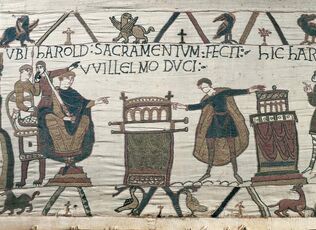Lendwist (< OE lǣn + wist; Cf. WFris. lienwêzen, Du. leenwezen, NHG Leh(e)nswesen, D

a. lensvæsen, Norw. lensvesen, Swe. länsväsen), known in English as Feudalism, is a fellowships-endbirdness (NE social order) in which a lord gifts or belends his underling with a lend (< OE lǣn; NE fief), made up of landholdings and note of goods and stuffs therein, for which the underling must yield troth, here-theenst, and scot. Lendwist is linked in most minds to the europish Middel Eld but may betoken like fellowships- and householdings-frameworks (NE social and economic systems) in other times and lands.
In its orshape the output of goods in a lendfellowship (NE feudal society) leans heavily on a dwellers-householding (NE subsistence economy). The bulk of the befolking is made up of churls or boors most of which are farmers or husbandmen by craft. They are dwellers on his land, but not the owndom of their landlord. They are tied to him as onhangers and are therefore unfree. This means:
- They are bound to the plot of land whereon they dwell and have no right to leave it.
- They are under his deeming might (NE jurisdiction; Cf. Da. dømmande makt).
- They owe their landlord burdens, in the shape of work-theenst as well as rawstuff-gifts which they themselves must harvest from his land as deal of a wont called sokenship (NE socage). Work-theenst and rawstuffgifts more and more became outsteaded by mint-ayieldings (NE monetary payments) over the flow of time.
Beginnings
Lendwist grew out of the the standingfellowship (Cf. Du. standensamenleven; NE class system) of the late Carolingish Rike. At first the Carolingish lords drew most of their might from the yearly hereferds (Cf. Icel. herferðar; NE campaigns) whereby they got plunder from their foes.
Section heading
Write the second section of your page here.